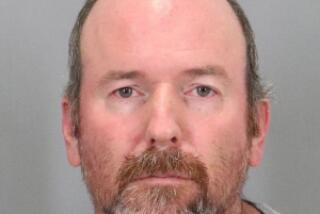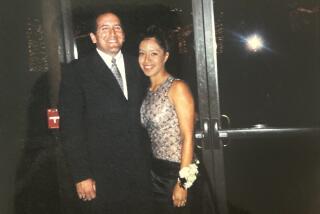Substituted Prints of Coach Submitted
- Share via
MISSION HILLS — A youth coach at Alemany High School and the YMCA dodged detection of his record as a sex offender by submitting someone else’s fingerprints and other false information for a background check, a state official said Friday.
Darryl McDonald, 36, used another person’s fingerprints for the check conducted for the North Valley YMCA in 1994, said Michael Van Winkle, a spokesman with the state Department of Justice.
McDonald then apparently turned in a copy of the YMCA’s favorable record check when he applied as head basketball coach at Alemany last year, Van Winkle said. He said it appears that Alemany staffers accepted that report without conducting an independent background check.
McDonald was convicted in 1989 of oral copulation with a minor, an offense that has landed him in the state’s sex offender database. Both Alemany and the YMCA, where McDonald administered youth sports programs, suspended McDonald this week pending an investigation.
Van Winkle said Alemany officials called the Department of Justice only last week to find out whether they could rely on the YMCA clearance or had to do an independent background check. State law requires all schools to conduct their own fingerprint criminal background checks of prospective employees and prohibits the hiring of those with a history of violent, sex or drug crimes.
McDonald’s lawyer, Jeffrey Brodey, declined to comment, except to say that it should not be so easy to slip past the system.
“I don’t understand that,” Brodey said. “Every time I’ve been fingerprinted, it’s been in a police department, right in front of a policeman. I showed ID.”
Van Winkle said the McDonald case shows how the background-check system can be defeated, although authorities do not know exactly how McDonald submitted the wrong fingerprints. However, he said McDonald also gave false or incomplete information on his date of birth and Social Security and driver’s license numbers, hampering efforts to check his record using his name and personal information.
A spokesman for the Los Angeles Catholic Archdiocese, which operates Alemany, said the school is still investigating the incident and does not know whether the school’s policy allowed the use of another agency’s background check or whether an exception was made for McDonald.
The Rev. Gregory Coiro, a spokesman for the archdiocese, said school officials initially told him they believed they had checked McDonald’s record, but that no evidence of the check was on file.
The only background check for McDonald in Alemany’s files was that done by the YMCA, Van Winkle said.
YMCA officials said they do not know where McDonald was fingerprinted.
Larry Rosen, president and chief executive officer of the YMCA of Metropolitan Los Angeles, said his organization fingerprints prospective employees at headquarters and also accepts print cards from outside contractors. However, in both instances, government-issued identification is required at the time the prints are rolled onto the card, he said.
“I feel very disappointed in Mr. McDonald,” Rosen said. “I feel very sorry for those who will be without the benefit of the good things he can do because of the bad things he has done.”
Rosen said the YMCA reevaluated its procedures in light of the McDonald case and found that they were appropriate. He said McDonald’s case was “one in a million.”
State officials do not think widespread fraud is being committed by job applicants required to get fingerprint criminal background checks, Van Winkle said. But he said the McDonald case suggests that fingerprint-takers should be certified or otherwise monitored by the state.
“This proves right here that it’s not a foolproof, 100% guaranteeable system,” Van Winkle said. “There are ways to get around the system.”
More to Read
Sign up for Essential California
The most important California stories and recommendations in your inbox every morning.
You may occasionally receive promotional content from the Los Angeles Times.










